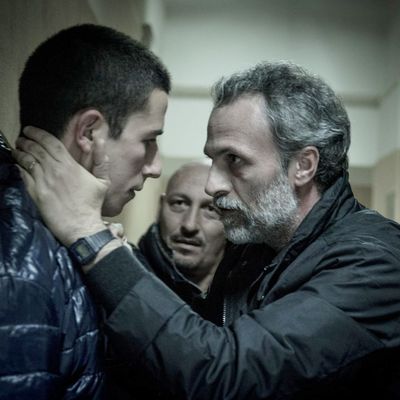
DonÔÇÖt be alarmed if you feel a little lost during the early scenes of the somber new gangster film Black Souls. Director Francesco Munzi lets his tragic narrative unfold gradually and subtly, like a neo-neorealist take on The Godfather. ThereÔÇÖs a good reason for this: He wants to show us his individual characters┬áÔÇö all members of the Carbone family ÔÇô in their different environments. And at first, this isnÔÇÖt quite the Mafia we recognize from movies. ThereÔÇÖs a mundane quality to this business: We see Rocco (Peppino Mazzotta), the boss, getting cash from his bankers so he can pay his men (many of whom, we may notice, have Middle Eastern names); we see his loose-cannon brother Luigi (strong-jawed Marco Leonardi ÔÇö who was once the fresh-faced teenage Toto in Cinema Paradiso) negotiating some kind of deal with a group of Spaniards; we see Luciano (Fabrizio Ferracane), the oldest, who wants nothing to do with his brothers and their world, tending his goats in the mountain village where they all grew up.
The trouble starts when Leo (Giuseppe Fumo), LucianoÔÇÖs son, takes a rifle to a family rivalÔÇÖs storefront. The antsy young man aspires to be like his uncles; he feels shame at his dadÔÇÖs stern, mopey pacifism. He wants that thing weÔÇÖve been told gangsters want the most: respect. Following LeoÔÇÖs actions, the machinery of the ineffable grinds into action: NobodyÔÇÖs ready to start shooting just yet, but small gestures of solidarity or penance begin to gain immeasurable importance. The brothers are all divided on how to proceed at first. But we know where itÔÇÖs all headed. And, slowly but surely, what seemed like a loose, authentic look at the underworld turns into an elemental family tragedy. The Carbones live in the shadow of a murder that happened many years ago, and each family member seems to have dealt with it in his own way. Now, we sense, the ghosts of the past are ready to be unleashed.
MunziÔÇÖs film may provoke comparisons to Matteo GarroneÔÇÖs 2008 film Gomorra, which similarly underplayed the typical gangster theatrics in favor of a more lived-in realism: It focused on the humdrum workings of the criminal underworld. But that was a social study of sorts; it was based on a piece of brave agitprop journalism from Roberto Saviano. Black Souls is altogether more novelistic and somber┬áÔÇö perhaps even mythical. ItÔÇÖs a hybrid: It seeks to marry that fascination with the particular and mundane with the brooding melodrama of a more traditional gangster film.
MunziÔÇÖs filmmaking is stately, but grim. HeÔÇÖs as much interested in space as he is in character: The windswept, empty village, and the desolate mountain roads that surround it, stand in sharp contrast to the bustling city where Rocco and Luigi do business. Similarly, menacing figures often step out of the deep background and shadows, as if theyÔÇÖve always been lurking there ÔÇö a nice, cinematic way to illustrate the idea that what weÔÇÖre watching is a violent untangling decades in the making. It may not quite have the explosive charm of some of the classics, but Black Souls is an elegant, unsettling addition to the gangster-movie canon. Get on its unique wavelength, and you may find it transfixing.


